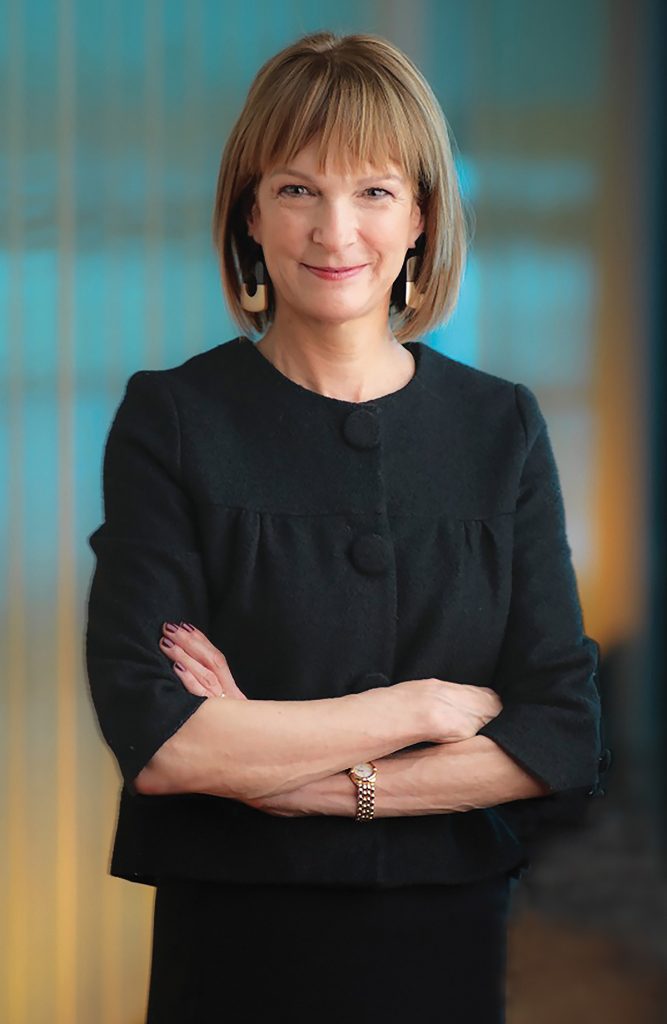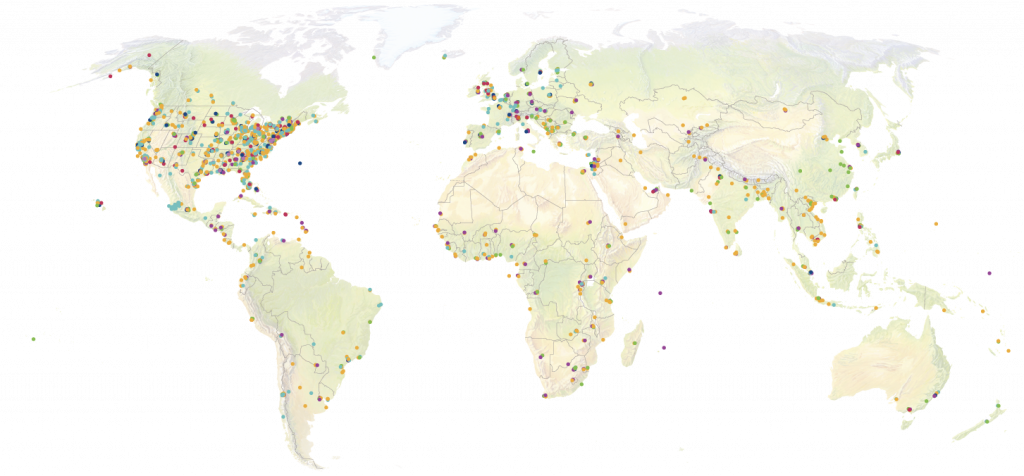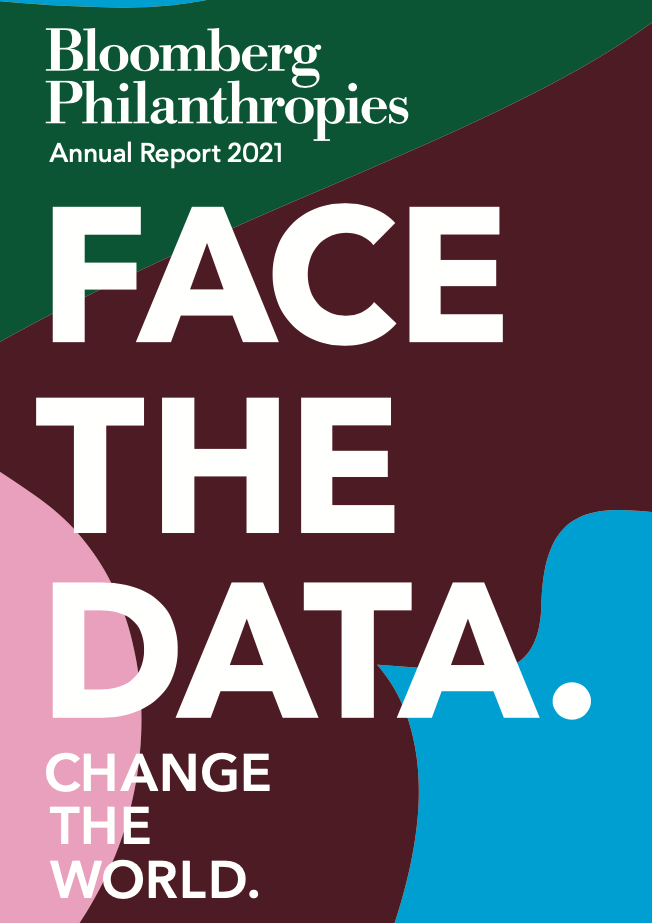
Annual Report 2021: CEO Letter
Patricia E. Harris
“By collecting and studying data, we are discovering the most effective strategies and working to spread them. As we often say, ‘If you can’t measure it, you can’t manage it.‘ Data remains at the heart of so much of our work, and we follow it wherever it leads.”
Annual Report / CEO Letter
As the UN’s COP26 approached in the fall, the first major climate summit since the 2015 Paris Agreement, we saw a unique opportunity to elevate our partners and their work.
Media attention focused on what new commitments national governments might make, and while that was certainly important, commitments are only as good as the actions taken to support them. Developing, adopting, and implementing national policies take time, which we don’t have a lot of, as well as political capital, and even the most deliberate efforts don’t always become law. The leaders we’ve long supported – like mayors, scientists, activists, business and philanthropic leaders, and local advocates – can act much faster. And so in the two months leading up to the summit, we decided to pull them all together in a push to build momentum, by taking 60 actions in 60 days.
For example: With partners like C40 Cities and the Global Covenant of Mayors, we rallied more than 1,000 cities to pledge to reach net zero emissions by 2030, decades earlier than many national governments have committed to doing. We worked with the mayors of London and Brussels to roll out localized air quality sensors and better manage the threat of toxic air pollution. And we collaborated with our colleagues at Bloomberg L.P., who are leading vitally important work to analyze the economic impacts of climate change and give companies and investors the data they need.
The response from our partners was overwhelmingly positive, and in just 60 days we took 85 concrete and meaningful actions to advance the climate fight. It was a testament to the power of strong partnerships, which lie at the heart of our approach to philanthropy. Working for Mike Bloomberg, whether in the public, private, or nonprofit sector, has always meant building partnerships that have the potential to make the greatest difference in people’s lives – an idea that informs everything we do at Bloomberg Philanthropies.
Over the past year, as COVID-19 continued turning the world upside down, we focused on strengthening and deepening our partnerships in ways that would allow us to respond to urgent needs quickly and decisively. The pandemic pushed those needs to new heights across all of our program areas, especially since much of our work focuses on the places it hit hardest: cities.
Global Reach
In 2021, Bloomberg Philanthropies invested in 941 cities and 173 countries around the world.

In working closely with U.S. mayors and local leaders, we realized they were having trouble navigating the complex process to access new funding available to them through the American Rescue Plan. To help, we teamed up with the U.S. Conference of Mayors to launch a COVID-19 Federal Assistance e311 program that provides cities with guidance and answers, including online resources and in-depth workshops led by emergency management experts. The program is now helping city leaders develop their pandemic recovery efforts and address other long-term challenges.
Given the global nature of the pandemic, we launched our first-ever Global Mayors Challenge, which built on previous competitions we had run in the United States, Europe, and Latin America and the Caribbean. Out of more than 600 city applications that proposed innovative solutions to their most pressing issues, we provided 50 finalists with extensive technical assistance and support to test and strengthen their proposals. We’re now working with 15 winning cities to implement their exciting ideas and to help spread their successes to other cities worldwide. More than 250 cities are already replicating effective ideas from earlier editions of the Mayors Challenge.
As the pandemic dragged on, arts organizations recognized they could not afford to wait for audiences to return. Survival meant strengthening and expanding their digital strategies to engage audiences beyond their physical walls and in-person programs. Those strategies, however, require new investments and expertise in technology and design, at a time when many organizations have seen their revenue streams dry up. To respond to their needs, we launched an effort with more than 40 cultural partners in the United States and the United Kingdom to help them create new digital initiatives and use technology effectively. These investments will long outlast the pandemic and help them emerge from it stronger than ever.
As Mike describes in his letter, the pandemic revealed a deep crisis in U.S. public schools that fell heaviest on lower-income Black and Hispanic communities, which led us to make our largest-ever investment in K-12 education: a $750 million initiative to create 150,000 new seats in charter schools across the country. We also expanded our career and technical education work, which first launched in 2016 with a series of promising, early-stage programs around the United States. These programs aimed to address the need for more job training opportunities for high school students and the shortfall of qualified candidates for jobs in high-demand fields like health care and IT. In 2021, we expanded the initiative to nine more cities and two more states.
Our education partnerships also helped us directly combat the pandemic. We worked with America’s four historically Black medical schools to create or expand their mobile vaccination programs and provide more equitable access to COVID-19 vaccines. Together with trusted community organizations, like churches and senior centers, the programs have administered tens of thousands of vaccine doses in communities with lower-than-average vaccination rates.
Our deepening relationships with Historically Black Colleges and Universities led us to launch a new scholarship program aimed at tackling the lack of diversity in science, technology, engineering, and math (STEM) fields, called the Vivien Thomas Scholars Initiative. The program is funding 100 students from HBCUs to receive doctorate degrees in STEM at Johns Hopkins University every year. It grew out of our Greenwood Initiative, which aims to accelerate wealth accumulation among Black households and address systemic underinvestment in Black communities.
One of the most disturbing trends to emerge from the pandemic was the worsening of the opioid epidemic. Last year, overdose deaths in the United States skyrocketed past 104,000, more than double the number from 2015, with the vast majority linked to opioids. As we continued working with Pennsylvania and Michigan, among the hardest-hit states, to increase access to medication and harm-reduction services, we expanded our program to five more states: Kentucky, New Jersey, New Mexico, North Carolina, and Wisconsin. By collecting and studying data, we are discovering the most effective strategies and working to spread them across all seven states, and beyond. As we often say, “If you can’t measure it, you can’t manage it.” Data remains at the heart of so much of our work, and we follow it wherever it leads.
The partnerships we’ve built drive the work we do every day, on every challenge.
Our progress in every area is made possible by our colleagues at Bloomberg L.P., with the vast majority of the company’s profits going to Bloomberg Philanthropies. Their partnership and support, and our collaboration with so many other organizations globally, is essential. That includes the strong partners we have in our Women’s Economic Development program, like Sustainable Growers, CARE, and Nest, which are all working to expand opportunities and earning power for women.
The partnerships we’ve built drive the work we do every day, on every challenge. I’m grateful for our inspiring partners – and also for our amazing team here at Bloomberg Philanthropies, who do so much to make progress toward our mission of ensuring better, longer lives for the greatest number of people. Together, they are why, despite the new and ongoing challenges we face, I’m so excited for all the work ahead.
Sincerely,

Patricia E. Harris
Chief Executive Officer
Bloomberg Philanthropies
Connect with Patti Harris on Twitter, Facebook, and LinkedIn.
